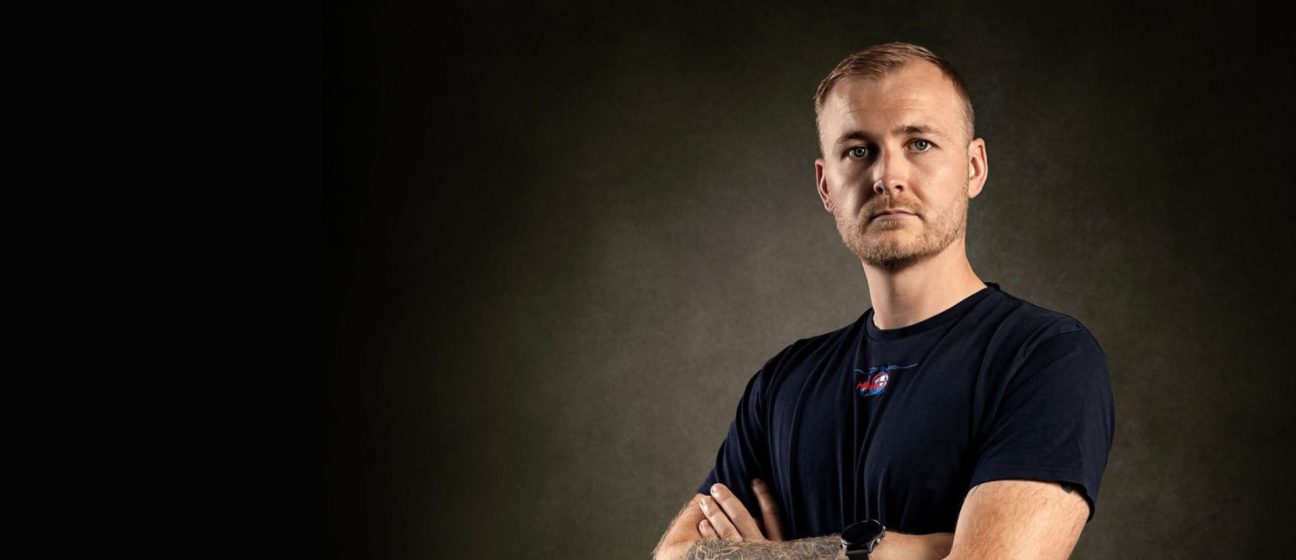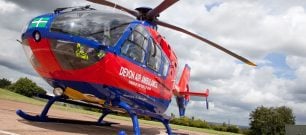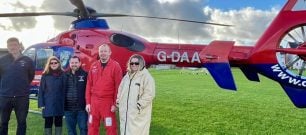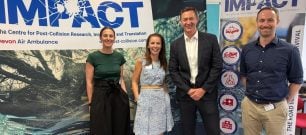
Aaron’s career choice was inspired by a defining childhood experience that made clear the personal qualities an emergency demands.
Who is Aaron?
Aaron’is a HEMS Technical Crew Member. His career choice was inspired by a defining childhood experience that made clear the personal qualities an emergency demands. Later, once established in his chosen career, one incident in particular drew heavily on the qualities he aspired to as a child.
Aaron's story
‘I was still in primary school when I first saw what it meant to be calm under pressure. My mum and I were driving home from a school disco when we saw a man collapsed at the side of the road. We pulled over and she called 999. When the ambulance arrived both she and the crew remained incredibly calm and focused. I was so impressed by how quickly the crew assessed the scene and got to work.
That my mum made the decision to step in and change the outcome for someone really made me think about how I too might one day help someone.
‘When I was old enough, I joined the Air Cadets where I learned basic first aid. It was the first time I felt the personal reward of helping others: I too could take action. I too could remain calm in a challenging situation.’
Managing emotional intensity
‘For me, as a dad to three young kids, the jobs that are most emotionally challenging are those affecting children. I relate very much to their parents who are going through perhaps the most fearful time of their lives.
‘We attended a difficult job where a young lad had been struck by a fallen tree and had fallen into water. When we arrived, his dad had pulled him out and his son had been given some CPR. The terrain was very difficult to land on, and we couldn’t land close by. When we got there, I could see the boy’s parents were in shock, so I looked after them while my crew mates set to work assessing, treating and stabilising their child, ready for his onward journey.
We’re considered in the level of information we share with families or bystanders, making sure they can access what’s going on rather than bombarding them with a lot of clinical information. A loved one needs reassurance: they just want to know if the patient is going to be OK.
‘In this scenario torrential rain had set in – a freak storm in the middle of June. We carried the boy over half a mile on a stretcher to the waiting aircraft. His mum felt helpless, so I told her: ‘He can hear you, let him know you’re here.’ These small things matter.
‘We flew to Bristol Children’s Hospital while the dad set off in the car. The boy’s mum sat in the cockpit with our pilot while we continued to monitor our little patient. Though the weather was against us our highly skilled pilot did an amazing job taking us safely to hospital.
‘Back at the base our whole crew were sitting quietly to reflect on what had been both a physically and mentally challenging ordeal, not only for our young patient and his parents, but for everyone involved.
‘But the outcome was a happy one and the little boy was soon back home with his parents. It’s always alarming to think how a pleasant family day out can suddenly take a turn. We’re glad we can be there when that happens.
‘That night I returned to my own family and hugged my kids a little bit tighter than usual.’
Team solidarity makes it work
‘Our buddy system is very helpful. If a colleague notices one of us is struggling or feeling out of sorts, they will drop that person’s buddy a message and they will check in with them. We don’t make a big deal out of it; it’s just another way we look out for each other – especially following a very serious incident.
We have a great rapport with each other. I’m a naturally bubbly person and banter can be important, but each of us knows when to engage this light-heartedness and when to not.
‘When I was new to the charity, I almost insulted one of our more experienced paramedics. He shared that he played rugby and I jokingly replied, ‘at your age?’ Thankfully, since then, we’ve shared a lot of laughs. Humour lifts our spirits and reminds us that we work with an amazing team. We read the room, we know each other well and when a little light-heartedness will help us.
‘Like my colleagues I find it intuitive to care for my fellow crew members by doing what I can to make each shift as good as it can be. We all know each other’s tea and coffee preferences and make a round without asking, which is always well received. Those little things make all the difference. We don’t take anything for granted. We respond to the reality of what we face day-to-day, and what we need to do to ensure the best possible outcome for our patients. It’s who we are and it’s who our patients need.’
As a charity that is clinically independent, Aaron and his team can benefit from advanced training, which means the patients we attend can access a different level of drug prescribing and surgical interventions if needed. Our patients can feel reassured that they are having an entire ER deployed to their side and they can receive emergency care as soon as our crew arrives. It’s not just about getting them to the nearest hospital.
That reassurance and skill is made available because of supporters like you.
We welcome your continued support to keep our service responding.



